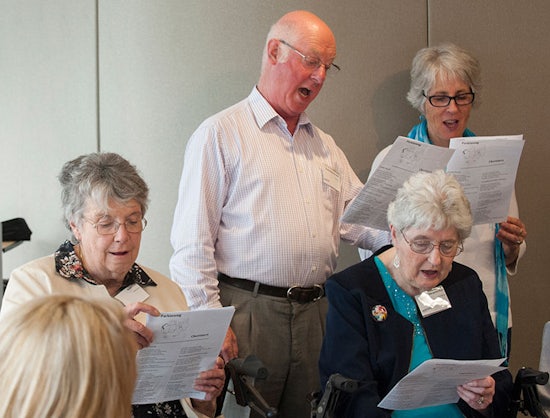World unites for Parkinson’s
The world’s Parkinson’s community is coming together on World Parkinson’s Day as part of a global campaign to raise awareness of the condition and spread a united message across the globe to encourage a bigger focus on Parkinson’s.

Regular singing and vocal exercises may help with improving some of the vocal issues associated with Parkinson’s
As part of the campaign people are urged to take to social media and share the message #UniteForParkinsons.
In 1817, Dr James Parkinson wrote ‘An Essay on the Shaking Palsy’ – in it he described a pattern of lessened muscular power, involuntary tremulous motion, even if these are supported.
This was the first paper to describe the debilitating motor symptoms in the body associated with Parkinson’s disease.
Two hundred years later, the world raises awareness of the disease on World Parkinson’s day, on 11 April, Dr Parkinson’s birthday.
Approximately 6.3 million people live with the condition worldwide and it is the second most common neurodegenerative disorder. In Australia, 1 in 350 people have the condition and more than 30 people are diagnosed daily according to Parkinson’s Australia.
It estimates 700,000 Australians are directly impacted by Parkinson’s, either by having Parkinson’s themselves, providing care to someone with Parkinson’s, or have a family member or close friend affected by Parkinson’s.
Since Dr James Parkinson wrote the essay, there has been much research into the cause and treatment of the disease.
General feedback and anecdotal evidence from a partnership between Parkinsons’ Victoria, Monash Health and Melbourne University is indicating regular singing and vocal exercises may help with improving some of the vocal issues associated with the disease.
“Issues, such as volume is a key thing for those living with Parkinson’s,” explains lead researcher Dr Jeanette Tamplin. Working with ParkinSong participants, a singing group for people with Parkinson’s and their carers, the study involves around 120 people from several groups singing on a weekly or monthly basis.
The ParkinSong sessions last for two hours, with 90 minutes singing, speech and voice exercises and a half hour social. Over the past year, Dr Tamplin says participants have been indicating areas of improvement, such as one participant saying his daughter told him he was louder on the phone.
Facilitator Louise Britzman, Speech Pathology Allied Health Assistant with Monash Health highlights says another benefit of the sessions is the shared language carers and people living with Parkinsons’ can use. Phrases such as ‘use more volume’ or ‘take a breath’ will remind participants to use their ‘loud voice’ in everyday settings.
She has also found participants find the singing sessions uplifting because there is a shared interest. “Other support groups may be more informational but we are giving distance from heavy topics and coming together in an uplifting way,” she says.
Data from the study is currently been collated and the formal results will be released later this year.
In other areas of research, University of Adelaide is focusing on better understanding the brain basis of non-motor symptoms of Parkinson’s disease, in the hopes of developing better treatment options.
“A piece of the puzzle missed by Dr Parkinson in his original essay is the fact that many people with Parkinson’s disease also suffer from non-motor impairments, such as cognitive dysfunction, depression and even a form of dementia,” says University of Adelaide Parkinson’s researcher Dr Lyndsey Collins-Praino, from the Adelaide Medical School.
“These non-motor symptoms are still poorly understood, and there are limited treatment options available. Two hundred years on, there remains an urgent need for effective treatments and prevention for Parkinson’s,” she says.
Among the current research projects being conducted by Dr Collins-Praino and her colleagues are:
- Testing a drug that may suppress inflammation in the brain. “This could have beneficial effects for both motor and non-motor symptoms of the disease,” Dr Collins-Praino says.
- Studying people with Parkinson’s disease and dementia with Lewy bodies (abnormal levels of protein that develop in nerve cells, a related condition). “This work aims to identify novel biomarkers that can help to predict the emergence and trajectory of cognitive dysfunction in Parkinson’s disease,” Dr Collins-Praino says. Conducted in collaboration with Professor Masahisa Katsuno (Nagoya Graduate School of Medicine, Nagoya, Japan)
- Investigating brain blood flow and its relation to cognitive function in Parkinson’s disease. “This research is motivated by the fact that many individuals with Parkinson’s disease suffer from low blood pressure, particularly when moving from sitting to standing. This may affect how blood is recruited to key brain regions during cognitive tasks,” Dr Collins-Praino says.
You can get involved in World Parkinson’s day by using the #UniteForParkinsons on social media. Visit its website more more information.











![The new Aged Care Act exposure draft is slated for release in December of 2023, but advocates hope to see it rolled out on January 1, 2024. [Source: Shutterstock]](https://agedcareguide-assets.imgix.net/news/articles/wp/agedcareact__0811.jpg?fm=pjpg&w=520&format=auto&q=65)












Comments